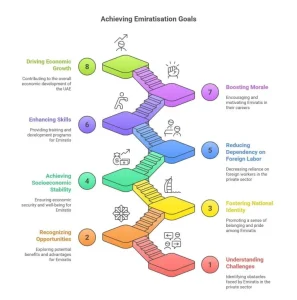Emiratisation in private sector is a great initiative by the UAE government to increase the number of UAE nationals. It aims to encourage Emiratis to become active participants in private companies. The UAE Government keeps updating Emiratisation programs as per the need.
Emiratisation has been introduced to address the challenges that UAE nationals face. There are several challenges that make hurdle for Emiratis to play their active role. On the other hand, with the advancement of the Emiratisation program UAE citizens enjoy multiple opportunities. This guide helps you understand the challenges before Emiratisation in private sector. It also discusses the opportunities in detail that Emiratisation offers.
In this article, we discuss:
- Why Emiratisation in UAE matters for UAE nationals
- Challenges and opportunities for Emiratis
So, without wasting a minute. Let’s delve into the details!
Why Emiratisation in Private Sector Matters?
Around the UAE, private sector emiratisation plays a crucial role for Emiratis. Under emiratisation, UAE nationals get more chances of employment than foreign nationals. According to the Emiratisation program, the employer needs to hire 2 UAE citizens out of every 50 employees.
Employing more UAE nationals in the private sector fosters the national identity of the UAE. Not only this it also becomes a symbol for achieving socioeconomic stability. The Emiratis feel encouraged, which leads to job satisfaction.
Introducing Emiratisation in private sector helps employers to reduce their dependency on foreign laborers. By doing so, the Emiratis will get more exposure in the job market.
Besides this, Emiratisation also offers several training and development sessions. It strengthens the local workforce and helps Emiratis enhance their skills.
Employing UAE nationals not only boosts their morale but also plays a part in UAE’s economic growth.

Challenges and Opportunities
By introducing emiratisation in private sector, it addresses several opportunities and challenges that are faced by Emiratis in the workplace. A few of them are discussed in detail.
Diversifying the UAE’s Economic Landscape
Emiratisation is the UAE government’s policy to increase the participation of Emiratis in the workforce. This is for the private sector, as the government sector has already employed UAE nationals. The reason increase number of Emiratis in the private sector is to reduce the reliance on foreign labor.
To diversify the UAE’s economic landscape, Emiratisation creates several opportunities for Emiratis across various industries. The Emiratisation program offers:
- Initiatives for companies to hire Emiratis
- Vocational training programs, and
- Fostering entrepreneurship among Emirati youth.
This helps the UAE government to build a sustainable economy. An economy that is less dependent on oil revenues. However, it starts investing in sectors like technology, finance, tourism, and healthcare. Emiratis are encouraged to contribute their skills in these sectors under the Emiratisation program.
Fostering Social and Cultural Sustainability
To foster social and cultural sustainability, Emiratisation plays a crucial role. It involves empowering Emiratis to take leadership roles. This enables them to participate in key decision processes.
This can include:
- Initiatives to promote Emirati arts, literature, and cultural events
- Investing in education and community programs
By doing so, the UAE aims to build a society that celebrates its rich diversity while embracing economic progress.
Driving Innovation and Knowledge Transfer
This approach aims to equip Emiratis with the advanced skills that are necessary to excel in the job market. When acquiring demanding skills, Emiratis will become more skillful. As a result, employers will be willing to hire more Emiratis than foreign nationals. It’s a win-win situation for the UAE’s economic growth
For this, several initiatives have been taken into account:
- Research and development sessions
- Mentorship programs, and
- Partnerships with leading institutions
Perceived Skill Gaps Between Emirati and Expatriate Candidates
By introducing Emiratisation in private sector, the UAE government takes the responsibility to upskill the Emiratis. Employers prefer to hire expatriates as they are more skilled than Emiratis. However, by minimizing the skill gap, the Emiratis can get more chances to get employment more easily than foreigners. For this, Emiratisation introduces several initiatives such as training and development programs, mentorship programs, and partnering with top institutions.
Addressing Specific Skill Set Needs in Different Industries
Emiratisation enables UAE nationals to address the different skill sets needed in different industries. The sectors such as technology, Finance, tourism, and healthcare are highlighted by the UAE government. Hence, the government makes extra efforts to address those specific skills that are related to these sectors.
Emiratisation in Action: Recent Policy Developments
According to the new policy, the employer needs to hire a minimum of 2 employees for every 50 employees in the private sector. However, the UAE government raised this rate in the future. By 2026, the rate will increase to 10%. That is, the companies have to hire 10 Emiratis for every 50 employees.
Increasing Emirati Hiring Targets for Private Companies
The recent policy update aims to increase the number of Emiratis in the private sector. The target to hire more Emiratis will increase in the near future. This is because the UAE government wants to increase the active participation of UAE nationals in the private sector. For this, they make advancements by keeping a view of the need.
Expanding Emiratisation Requirements to Smaller Businesses
Emiratisation encourages small businesses to hire Emiratis in their workforce. Small businesses need to follow certain quotas. Companies with 20 to 49 employees must hire one UAE citizen in 2025. However, in the next year, which is in 2026, they should hire one more Emirati. This policy is for selective sectors such as:
- Real estate
- Education
- Construction
- Healthcare
The Role of the Ministry of Human Resources and Emiratisation
The emiratisation program has been introduced to increase the inclusion of national talent in the private sector. It is regulated by the Ministry of Human Resources and Emiratisation (MOHRE). The MOHRE is responsible for regulating and advancing the programme when it wants.
The UAE Ministry of Human Resources and Emiratisation (MOHRE) has recently enhanced the programme. According to the recent advancement, it requires increased participation by the private sector to hire Emiratis
FAQs
What is Emiratisation in the private sector?
Emiratisation is an initiative by the UAE government specifically designed for Emiratis to increase their participation in the private sector.
What is a recent Emiratisation policy?
According to the recent policy update, employers should hire 2% Emiratis for 50 or more 50 employees. If fewer than 50 employees, then they need to hire at least one Emirati.
What is the aim behind Emiratisation?
Emiratisation aims to reduce the dependency on foreign labor by encouraging UAE nationals. For this, the UAE government has taken several initiatives, such as training programs, mentorship programs to upskill Emiratis, partnering with leading institutions to enhance their skills, and others.



